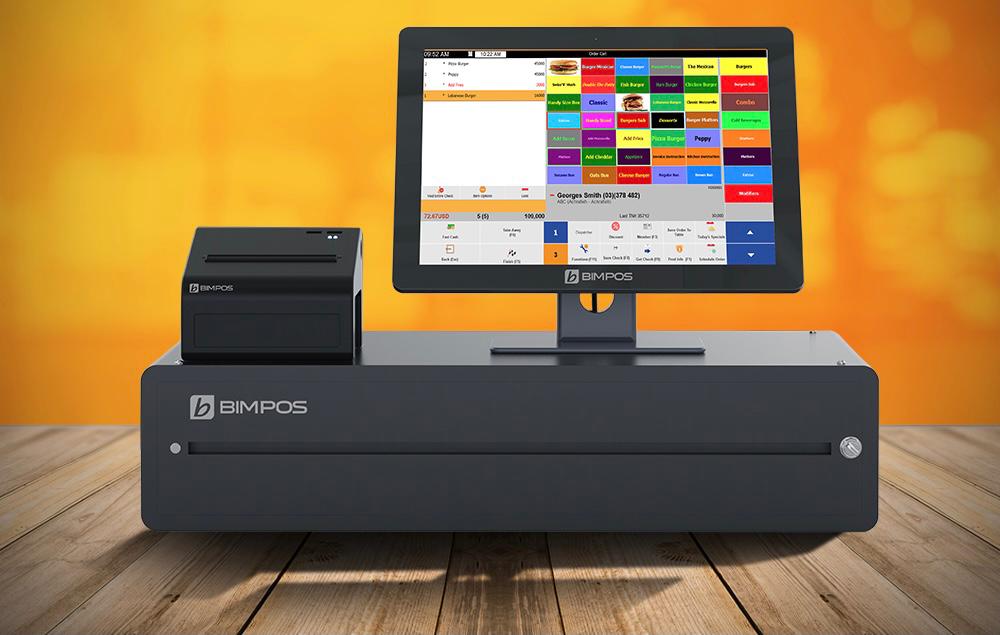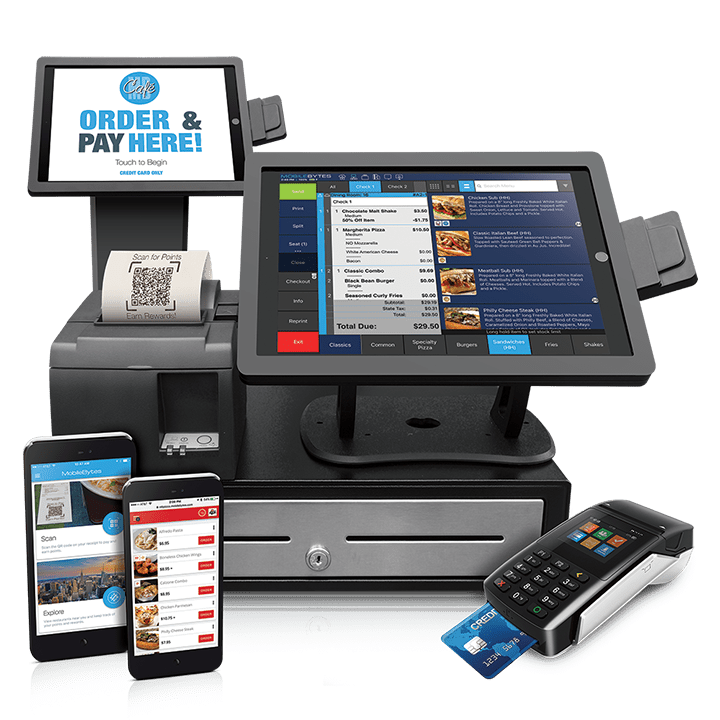See This Report on Pos
See This Report on Pos
Blog Article
Things about Pos Machine

Clover POS: Retail Point-Of-Sale Solutions Streamline Deals
The Best Strategy To Use For Point Of Sale Systems

Hardware Elements of a Point of Sale System What makes a POS system tick? It's not simply software application; the hardware plays a starring role. Consider it as the body to the software application's brain. Without the right hardware, even the most advanced POS software application is simply a pretty face. Essential POS Hardware So, what are the must-haves? Let's simplify. The main processing system, frequently a computer system or tablet, is the heart of the operation. The screen or touchscreen display enables staff to communicate with the system. A barcode scanner accelerate the checkout procedure. Remember the days of manually entering each code? The reliable invoice printer provides customers with a record of their purchase. A cash drawer keeps your money safe and organized. A card reader enables clients to pay with credit or debit cards. Diving Deeper: Beyond the Basics However wait, there's more! Depending upon your company, you might need customized hardware. For instance, a restaurant may incorporate cooking area printers to relay orders, while a store may use label printers for item tagging. Ever question how your local bakery quickly prints those delicious-looking labels? Selecting the Right Hardware: A Balancing Act check here Choosing the best hardware isn't just about buying the most pricey devices. It has to do with finding the sweet spot between functionality, toughness, and budget plan. A little service simply beginning out might choose a more fundamental setup, while a high-volume retailer will require robust, high-performance devices. Is it much better to purchase brand-new or utilized? Consider your options thoroughly. A brand-new system uses the current technology and warranty security, but a refurbished system can conserve you cash. The Future of POS Hardware What does the future hold? Expect to see a lot more integration with mobile devices, biometric scanners for employee authentication, and advanced analytics dashboards displayed on larger, clearer screens. Picture a world where inventory is automatically upgraded in real-time as products are scanned-- a world where you can track your best-selling product from throughout the world. The possibilities are unlimited, and the hardware is continually developing to meet the needs these days's services. Are you prepared to upgrade your point of sale system?
Software Characteristics and Capabilities: The Heart of Your POS System
Ever view a skilled barista glide through a busy morning rush? Their secret isn't just caffeine; it's a smooth dance with their POS system. The software application is the conductor of your service symphony, orchestrating whatever from sales to inventory. But what notes should you be listening for? What abilities genuinely matter in today's market?
Stock Management: Beyond Counting Beans
Forget spreadsheets that haunt your dreams. Modern POS systems provide real-time stock tracking, notifying you when your stock of artisanal coffee beans dips precariously low. Consider it as a digital guardian angel, preventing those uncomfortable "Sorry, we're out!" minutes to customers. What if you could also anticipate need based upon historical information? Numerous systems now use forecasting tools, a powerful weapon against overstocking and lost sales. This assists avoid the situation of lacking popular products or collecting excess stock of slow-moving products, both of which can constrain cash flow and area.
Sales Reporting and Analytics: Decoding the Data
Sales information is the brand-new gold, and your POS system is the miner. Forget simply understanding how much you offered today. Dive deep into the data to discover patterns, determine your best-selling products, and understand client behavior. Which menu item pairs completely with the day-to-day special? Which promo resonated most with your customers? These insights are not just interesting; they're actionable intelligence. Without reliable sales reporting, navigating the complexities of business decision-making ends up being like sailing without a compass, increasing the opportunity of mistakes and missed opportunities.
Customer Relationship Management (CRM): Building Bridges, Not Walls
Remembering a regular client's name and favorite order is captivating, but scaling that personal touch is challenging. POS systems with CRM capabilities allow you to track consumer purchase history, preferences, and even birthdays. Think of immediately using a discount rate on their birthday-- a small gesture that promotes commitment and motivates repeat company. However there is the prospective snag of bad information quality, which can cause incorrect customer profiles and inadequate marketing efforts.
Payment Processing: Streamlining the Deal
The checkout experience can make or break a sale. Seamless integration with different payment methods-- charge card, mobile wallets, even copyright-- is non-negotiable. Can your system deal with split payments? Does it use safe and secure tokenization to safeguard client information? A cumbersome payment procedure is like striking a sour note in your business symphony, possibly interrupting the whole efficiency. Ensuring compatibility with progressing payment innovations and adherence to security requirements are paramount for maintaining consumer trust and functional performance.
Employee Management: Keeping the Team in Sync
From clocking in and out to managing approvals and tracking efficiency, employee management features improve operations and enhance responsibility. Is scheduling a headache? Lots of POS systems offer integrated scheduling tools, enhancing staffing levels based on anticipated demand. A common challenge that is often ignored is the difficulty of integrating worker management performances with payroll systems, which can result in mistakes and ineffectiveness in wage computations.
Advanced Features: Leveling Up Your Operations
- Table Management: Perfect for dining establishments, this function allows you to visualize your dining space, track table status, and manage reservations.
- Commitment Programs: Reward your finest customers and motivate repeat organization with integrated commitment programs.
- Online Buying Combination: Seamlessly integrate your POS system with online ordering platforms to broaden your reach.
Picking the best POS system is about more than simply performance; it's about discovering a partner that can grow with your organization. Consider your present needs, prepare for future growth, and do not be afraid to ask the tough questions. The right software can transform your service from a disorderly cacophony into an unified masterpiece.
Industry-Specific POS System Applications
Think about the regional bakeshop, bustling with morning customers yearning fresh croissants. A generic POS system might deal with deals, however can it handle complicated recipes, track ingredient stock, or immediately adjust production schedules based on sales data? Most likely not. That is where the beauty of industry-specific POS systems shines.
Restaurants and Hospitality
For dynamic restaurants, speed and precision are critical. How numerous times have you seen servers managing orders, adjustments, and splitting costs, all while attempting to offer exceptional service? A restaurant POS system improves these processes, permitting table management, cooking area order tickets, and even online ordering combination. These systems often include features like ingredient-level stock tracking, crucial for managing food costs and minimizing waste. Ever question why your preferred meal is in some cases not available? It might stem from an absence of proper stock management.
- Table Management
- Kitchen Order Tickets
- Online Buying Integration
- Ingredient-Level Inventory Tracking
Retail Solutions
Retail, with its varied stock and client interactions, demands a different set of tools. Imagine a store clothes store having a hard time to keep an eye on sizes, colors, and seasonal collections utilizing a fundamental checkout system. An industry-specific retail POS system provides features like barcode scanning, consumer loyalty programs, and comprehensive sales reporting. These systems can even integrate with e-commerce platforms, supplying a smooth omnichannel experience for clients. Did you know some retail POS systems can forecast future sales trends based upon historic information? Now that is effective!
The Perils of a Mismatch
Choosing the wrong POS system can develop significant functional hurdles. A clothing shop using a restaurant POS, for instance, would discover it inappropriate for managing inventory with sizes and colors. The lack of proper reporting and analytics could cause misinformed buying decisions and lost earnings. The result might be comparable to attempting to fit a square peg in a round hole.
Secret Factors to consider
Choosing an industry-specific POS system requires mindful examination. Consider your organization's special requirements and operational workflows. Does the system integrate with existing software? Does it provide the needed reporting abilities? Is it scalable to accommodate future growth? A well-chosen POS system is not simply a transaction tool; it's a strategic possession that can drive effectiveness, improve consumer fulfillment, and eventually, increase your bottom line. Keep in mind, it is an investment in your organization's future, not just an expense.
Security Considerations for Point of Sale Systems
Ever heard the tale of the mom-and-pop shop that lost everything due to the fact that of a single, ignored security defect in their POS system!.?. !? It's a cautionary tale, and it highlights a critical element typically eclipsed by the attraction of elegant features and structured operations. The reality is, a POS system is just as great as its security. What good is a system that crunches numbers in a flash if it allows wrongdoers to swipe consumer's information simply as rapidly?
The Vulnerability Minefield
The digital landscape is a battlefield. Every POS system, regardless of size or sophistication, is a potential target. Are you really prepared for the risks lurking around the corner? The real pinch comes when you find that your out-of-date software has a gaping hole that hackers can exploit, turning your business into an unwitting accomplice in identity theft. The difficulty is that hackers are crafty and are always altering their techniques.
Common Security Spaces and Expert Tips
- Weak Passwords: "Password123" isn't sufficing. Use strong, unique passwords for all POS system accounts and alter them regularly. Two-factor authentication is a must.
- Unsecured Networks: Your Wi-Fi is like leaving the front door open. Secure your network with strong encryption (WPA3 if possible) and consider a separate network for your POS system.
- Outdated Software Application: Software application vendors patch security holes all the time. Failing to update is like inviting trouble. Establish automated updates or schedule routine upkeep.
- Staff member Training: Your personnel is your very first line of defense. Train them to acknowledge phishing efforts, safeguard passwords, and report suspicious activity.
Data File Encryption: Your Guard Versus the Dark Arts
Think of data encryption as a secret code. It scrambles sensitive details, like credit card numbers, making it unreadable to unapproved users. Without file encryption, your clients' monetary information resemble sitting ducks, ripe for the selecting by cybercriminals. It's not almost protecting your customers; it's about safeguarding your credibility and preventing large fines.
PCI Compliance: The Rulebook You Can't Overlook
If you accept charge card, you're bound by the Payment Card Industry Data Security Standard (PCI DSS) It's a set of security standards created to secure cardholder information. Failing to comply can result in fines, penalties, and even the loss of your ability to process charge card payments. It's a headache, yes, however it's a needed one. Think of PCI compliance as the expense of doing business in the digital age.
Consider this: every deal processed through your point of sale is a possible entry point for harmful actors. By executing robust security procedures, you're not just securing your organization; you're safeguarding your consumers' trust and guaranteeing the long-term viability of your operations. The security of your POS system isn't simply a technical problem; it's a company vital. It needs consistent vigilance, proactive measures, and a dedication to staying ahead of the curve.